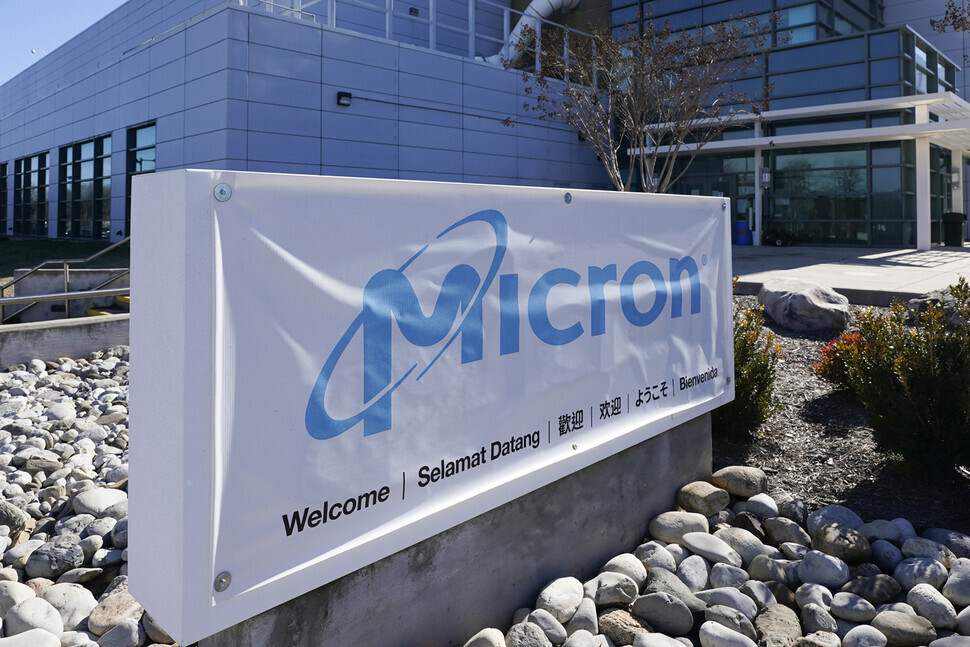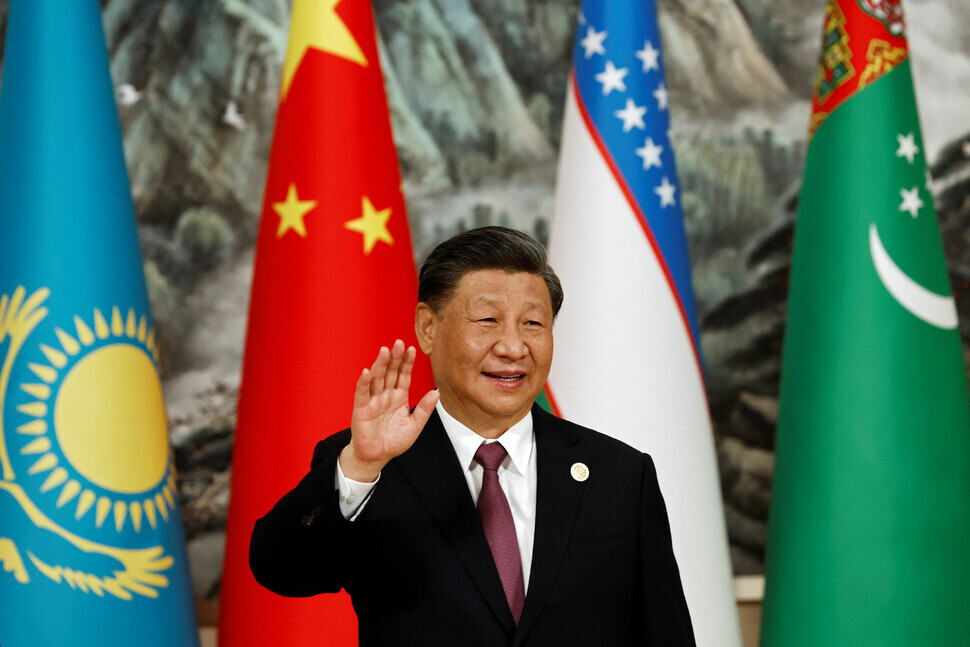hankyoreh
Links to other country sites 다른 나라 사이트 링크
As chip war between US, China escalates, S. Korea is left between rock and hard place

The strategic rivalry between the US and China in the semiconductor sector and other high-tech industries has taken a confrontational turn with China announcing sweeping sanctions against the US semiconductor company Micron Technology on Sunday.
China unveiled its proposed sanctions against US memory chipmaker Micron on the final day of the Group of Seven summit, a gathering of rich industrial nations, showing its new action plan to the world and making it clear that the move was in retaliation to the US.
Only one day later, China has shown that its eyes are on South Korea, a memory chip powerhouse, putting Korea in a tough spot in the midst of the desperate strategic competition between the United States and China.
“The review based on the Cybersecurity Law found that Micron’s products have serious network security risks, which pose significant security risks to China\'s critical information infrastructure supply chain and affect China\'s national security,” the Cyberspace Administration of China, said in a statement posted on Sina Weibo, a Chinese blogging site, at 8 pm on Sunday. It also stated that “operators of critical information infrastructure in China should stop purchasing Micron products.”

The review began on March 31 and the order was issued just in time for the final day of the G7 summit. This is the first time China has sanctioned a US semiconductor company based on a safety review under the Cybersecurity Law of 2017.
China’s rationale for this action was that the company posed “significant security risks to China’s critical information infrastructure supply chain,” which in turn could “affect the national security” of China.
In May 2019, the US Department of Commerce placed Huawei, a Chinese powerhouse in fifth-generation communications (5G), on its “entity list, claiming that the company could jeopardize US national security. Companies on the blacklist are prohibited from receiving exports from the US as a matter of principle.
In October 2022, the US Department of Commerce, along with allies such as Japan and the Netherlands, banned exports of advanced semiconductors and semiconductor equipment to China under the claim that these exports harmed US national security.
China is using the same logic that the US used to target Chinese high-tech industries to give the US a taste of its own medicine.
The move could also be interpreted as a rejection of “de-risking,” a new approach to China that the major powers of the G7 proposed in a joint declaration on Tuesday.
“Our export controls will remain narrowly focused on technology that could tilt the military balance,” US national security advisor Jake Sullivan said on April 27, noting that the United States is pursuing “de-risking and diversifying, not decoupling.”
Furthermore, the G7 also expressed in their joint statement that “our policy approaches are not designed to harm China nor do we seek to thwart China’s economic progress and development,” but are for the sake of “reduc[ing] excessive dependencies in our critical supply chains.” China has fired back at the US for using national security as a pretense for slapping regulations on Chinese companies.
China’s retaliation against the US has added to concerns in South Korea.
While the US semiconductor companies pulling in the most revenue from China are Qualcomm (64% of revenue), Intel (27%), and AMD (22%), China has targeted memory chipmaker Micron (10.8%, or US$33.1 billion).
Avoiding companies that make non-substitutable system semiconductors, it scapegoated Micron, which has strong “alternative buyers” in Samsung Electronics and SK Hynix. On April 23, the US government asked South Korea to ensure that Samsung and SK Hynix would not sell semiconductors to China if China banned the sale of Micron semiconductors, the UK’s Financial Times reported.
China was fiercely wary of the US’ actions.
“The US has coerced other countries into imposing export restrictions on China for the sole purpose of maintaining its hegemonic interests,” Chinese Foreign Ministry spokesperson Mao Ning said at a regular briefing on Monday. “Such practice runs counter to the market economy principles and international trade rules, destabilizes global industrial and supply chains, and serves no one’s interest.”
She also went on to mention that “it is hoped that the governments and companies of relevant countries will work together with China to jointly safeguard the multilateral trading system and keep global industrial and supply chains stable.”
The “relevant countries and companies” are believed to include South Korea and Samsung Electronics. This puts South Korea in a serious dilemma: comply with US demands and risk Chinese retaliation, or refuse and risk damaging the South Korea-US alliance.
By Choi Hyun-june, Beijing correspondent; Lee Bon-young, Washington correspondent
Please direct questions or comments to [english@hani.co.kr]

Editorial・opinion
![[Column] When ‘fairness’ means hate and violence [Column] When ‘fairness’ means hate and violence](https://flexible.img.hani.co.kr/flexible/normal/500/300/imgdb/original/2024/0516/7417158465908824.jpg) [Column] When ‘fairness’ means hate and violence
[Column] When ‘fairness’ means hate and violence![[Editorial] Yoon must stop abusing authority to shield himself from investigation [Editorial] Yoon must stop abusing authority to shield himself from investigation](https://flexible.img.hani.co.kr/flexible/normal/500/300/imgdb/original/2024/0516/4417158464854198.jpg) [Editorial] Yoon must stop abusing authority to shield himself from investigation
[Editorial] Yoon must stop abusing authority to shield himself from investigation- [Column] US troop withdrawal from Korea could be the Acheson Line all over
- [Column] How to win back readers who’ve turned to YouTube for news
- [Column] Welcome to the president’s pity party
- [Editorial] Korea must respond firmly to Japan’s attempt to usurp Line
- [Editorial] Transfers of prosecutors investigating Korea’s first lady send chilling message
- [Column] Will Seoul’s ties with Moscow really recover on their own?
- [Column] Samsung’s ‘lost decade’ and Lee Jae-yong’s mismatched chopsticks
- [Correspondent’s column] The real reason the US is worried about Chinese ‘overcapacity’
Most viewed articles
- 1Could Korea’s Naver lose control of Line to Japan?
- 2[Column] Welcome to the president’s pity party
- 3[Column] US troop withdrawal from Korea could be the Acheson Line all over
- 4Naver’s union calls for action from government over possible Japanese buyout of Line
- 5[Editorial] Korea must respond firmly to Japan’s attempt to usurp Line
- 6Korea cedes No. 1 spot in overall shipbuilding competitiveness to China
- 7[Editorial] Yoon must stop abusing authority to shield himself from investigation
- 8[Column] When ‘fairness’ means hate and violence
- 9Korean opposition decries Line affair as price of Yoon’s ‘degrading’ diplomacy toward Japan
- 10Second suspect nabbed for gruesome murder of Korean in Thailand, 1 remains at large